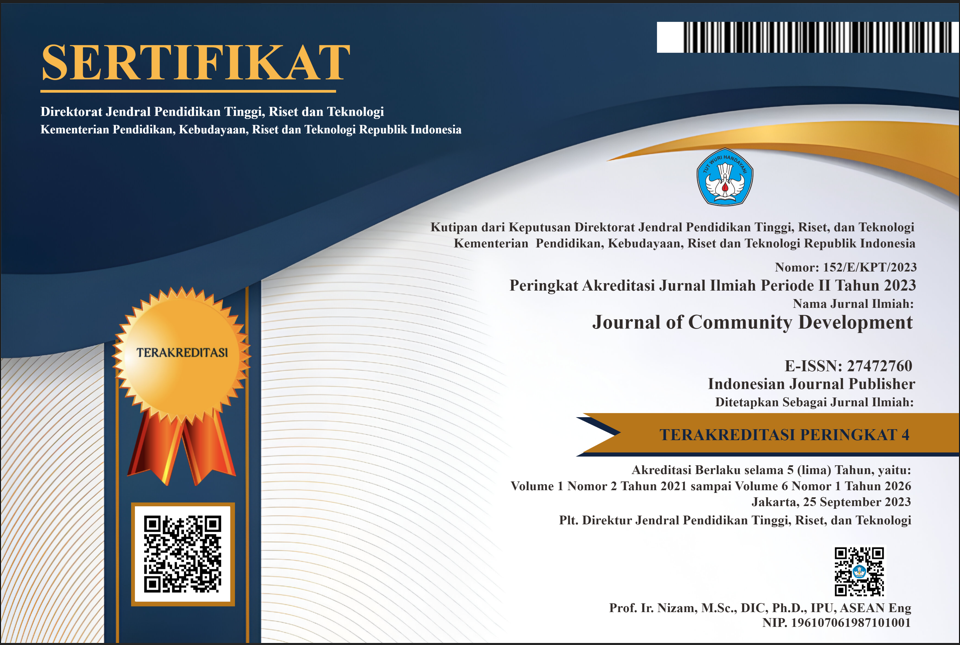Penerapan Budidaya Hidroponik Sistem Vertikal di SMPN 7 Jember Sebagai Langkah Solutif Program Urban Farming
DOI:
https://doi.org/10.47134/comdev.v5i3.1473Keywords:
Vertical System Hydroponics, Adiwiyata School, Urban FarmingAbstract
A significant global issue faced by urban areas worldwide is the extensive conversion of agricultural land. In Indonesia, data from the Central Statistics Agency (BPS) in 2021 indicates that the conversion of national rice fields ranges from 60,000 to 80,000 hectares annually. This trend poses a serious threat to the availability of rice and other food sources. Therefore, urban agriculture represents a practical solution for ensuring food availability in a sustainable and independent manner. One applicable technology is the Vertical Hydroponic Farming System. The objectives of this initiative are: (a) to equip teachers with technical skills so they can serve as trainers for their students, and (b) to provide technical support to SMPN 7 Jember, an environmentally friendly school, in its pursuit of achieving Adiwiyata School status at the East Java provincial level by 2024. The methods employed include: (a) delivering theoretical foundations of hydroponic farming systems through traditional lectures, (b) hands-on practice involving the construction of hydroponic installations, seeding and transplanting techniques, maintenance, harvesting, and post-harvest handling, and (c) implementing hydroponic installations and cultivation at SMPN 7 by actively engaging both teachers and students. In conclusion: (a) there was a 110% increase in teachers' knowledge and skills related to hydroponic farming, with evaluation results of the technical guidance averaging 4.9 (very good), and (b) the implementation of hydroponic installations and cultivation at SMPN 7 Jember progressed smoothly, supporting the school in its goal of achieving Adiwiyata School status at the provincial level.
Downloads
References
[1] Prilyscia, A., Sutarno, Rahayu. 2018. Hubungan Alih Fungsi Lahan Dan Perubahan Iklim Terhadap Hasil Komoditas Pertanian Di Jumantono. Agrotech Res J Vol 2. No 1. 2018: 28-34 ISSN: 2614-7416. https://jurnal.uns.ac.id/arj/article/view/19424
[2] Surat Keputusan Menteri Pertanian. 2021 Renstra-Kementan 2020-2024.
[3] BPS. 2022. Sensus.bps.go.id/topik/tabular/ sp2022/187/0/0
[4] Kementerian Pertanian Republik Indonesia. 2023. Urban Farming: Strategi Pemanfaatan Lahan Perkotaan. https://repository.pertanian.go.id/server/api/ core/bitstreams/adc6bd4b-914a-4e2e-900c-05964807c90e/content.
[5] Kementrian Negara Lingkungan Hidup, Panduan Adiwiyata, 2009. Wujudkan sekolah peduli dan berbudaya lingkungan, halaman 9.
[6] SMPN 7 Jember. 2024. Data Pokok UPTD SMPN 7 Jember. https://dapo.kemdikbud. go.id/sekolah/563FD01604AD71EDAB2F.
[7] Riyanto, S (2022), Kelebihan dan Kelemahan Sistem hidroponik Deep Flow Technique (DFT), https://legioma.republika.co.id/posts/55242/kelebihan-dan-kelemahan-sistem-hidroponik-deep-flow-technique-dft
Downloads
Published
How to Cite
Issue
Section
License
Copyright (c) 2024 Iswahyono, Siti Djamila, R. Abdoel Djamali, Amal Bahariawan, Didiek Hermanuadi

This work is licensed under a Creative Commons Attribution 4.0 International License.







